Top MBA Internship Opportunities in the London Metro

As a center for global commerce and business, London is one of the top cities in the world to earn an advance business degree and secure an MBA internship. Continue reading…
Wharton MBAs, Justin Tuck, Challenge Classmates

“If every MBA pledged just 1 percent of their post-MBA salary to charitable giving, what might be the potential social ramifications?” That was the question Kate Epstein and Josh McCann sought to answer when they were MBA students at the University of Pennsylvania’s Wharton School. The 2014 graduates would go on to found One for the World in an effort to make philanthropic giving easier, and even capturing the attention of former NFL star Justin Tuck.
McCann first proposed the idea as part of speech assignment, and Epstein came on board to help grow it into an organization with chapters at universities all over the country that focus on giving back in significant ways. With more than 300 members across six schools, the One for the World movement has impacted charitable donations around the globe—and its influence continues to grow.
More recently, former NFL New York Giants and Oakland Raiders player Justin Tuck, a 2018 Wharton graduate, sought to encourage participation among current students as part of an April One for the World “Lunch and Learn” on campus. He discussed the importance of giving now, advising attendees not to wait to give until the have “more money.” Tuck explained that giving just 1 percent of your salary now won’t really impact your bottom line and has the potential to make a major difference in the world.
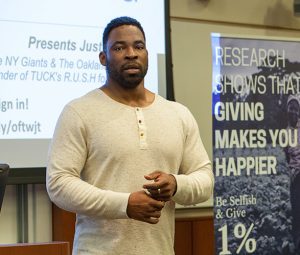
Former NFL player Justin Tuck speaks at an MBA lunch event / Photos by S. Nibras Islam.
Tuck, who himself has taken the pledge, talked about how the organization made an impact on his personally. “One for the World has lowered the boundary of entry for giving to kaput. I don’t have to perform due diligence on how much of what I’m kicking in is furthering the mission— they’ve done that for you.”
This year has been Wharton’s most charitable year thus far. The MBA Class of 2018 has pledged more than $86,000 to various charities, with 13 percent of the class taking part. As for where those donations have made a difference, One for the World carefully vets each of its philanthropic organizations to analyze the ones that are most effective.
In just four years, that charitable impact has afforded 400 years of healthy life to people around the world, provided clean water to more than 28,000 people, donated health products and services to more than 10,000 people, and much more.
For Tuck, the key to giving is to simply hit the ground running. “There’s opportunity and need everywhere. Find something you’re passionate about.”
To learn more about One for the World, read the full news story on the Wharton MBA website.
This article has been edited and republished with permissions from our sister site, Clear Admit.
The Texas MBA Programs Guide: Houston vs. Dallas
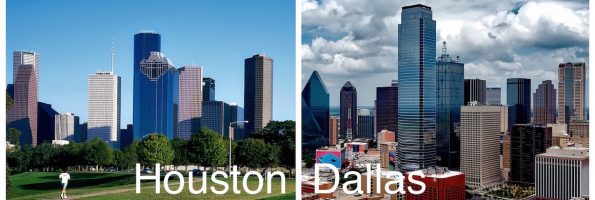
If you’re looking to earn a Texas MBA, where should you go to school? Should you choose a top MBA program in Dallas or Houston? First, we need to take a look at the cities.
Living in Dallas vs. Houston
First, let’s take a look at the cost of living in Dallas vs. Houston. According to Numbeo, the world’s most extensive database containing user contributed data about cities, the overall cost of living is relatively similar: $4,242 in Houston compared to $4,000 in Dallas. Houston barely edges out Dallas with a slightly higher cost of living, and here’s how that’s broken down.
- Consumer Prices: 35 percent higher in Houston
- Rent Prices: 7.30 percent higher in Houston
- Restaurant Prices: 27 percent higher in Houston
- Groceries Cost: 95 percent higher in Houston
- Local Purchasing Power: 26 percent lower in Houston
Other things to consider when choosing between Dallas and Houston include:
- Industries
- Houston is known for being the oil capital and is an ideal location for jobs in the energy industry.
- Dallas, on the other hand, is known for real estate (Tramelle Crow is headquartered here), as well as hedge funds and asset management firms.
- Economic Development: According to Site Selection Magazine, Houston and Dallas are comparatively equal when it comes to economic development, ranking second and third respectively.
- Top Companies: Houston edges out Dallas for being home to more Fortune 500 companies. In fact, Houston is home to 27 top companies compared to 14 in Dallas. However, they rank second and third respectively.
However, according to Forbes, “while Houston and Dallas have decent amenities (and having better ones surely wouldn’t hurt), they aren’t places that offer a unique lifestyle brand, such as charming architecture or a cutting-edge arts scene.”
Texas MBA Programs
The next step is to compare the top three MBA programs in each city. In particular, we wanted to take a look at the tuition rates (two years), GMAT averages, and post-graduation salaries at each program in each city to get a well-rounded picture.
Overall, there are a few things to note right away.
- The top full-time MBA programs in both cities are ranked well. However, Houston programs tend to rank higher on major ranking sites such as The Economist and Bloomberg Businessweek.
- Houston tends to be more expensive regarding tuition ($93,052 vs. $69,191), but it also pays a higher salary ($110,000 vs. $92,000). This balances out with around a $25,000 difference in tuition and a $20,00 difference in post-graduation salary.
- Finally, GMAT averages for class profiles tend to be higher in Houston as well (688 vs. 660).
Here’s how it all breaks down per school.
Top 3 Houston MBA Programs
McCombs School of Business – University of Texas at Austin
The McCombs School of Business offers a full-time MBA, an Evening MBA, a Weekend MBA, and an Executive MBA program. And it’s considered one of the top business schools in the country, consistently ranking highly on various lists, including ranking 28 according to The Economist.
- Tuition Rates (two years): $91,000
- GMAT Averages: 703
- Post-Grad Salaries (Mean): $117,068
Rice University – Jones Graduate School of Business
The Jones Graduate School at Rice University offers a full-time MBA program, an MBA for Professionals (part-time), and an Executive MBA Program. The school’s full-time MBA program ranked 10th on the Bloomberg Businessweek list in 2017.
- Tuition Rates (two years): $116,000
- GMAT Averages: 711
- Post-Grad Salaries (Mean): $112,158
Mays Business School – Texas A&M University
The Mays Business School has both a full-time MBA program as well as a part-time Professional MBA program. In addition, the school offers an Executive MBA. In 2017, The full-time MBA program ranked 20th overall by Forbes, and 22nd overall by Bloomberg Businessweek.
- Tuition Rates (two years): $72,158
- GMAT Averages: 649
- Post-Grad Salaries (Mean): $103,299
Top 3 Dallas MBA Programs
Naveen Jindal School of Management – University of Texas at Dallas
The Naveen Jindal School offers a full-time MBA, part-time Professional MBA, Executive MBA, and Global Leadership Executive MBA program. The full-time MBA is well ranked according to the U.S. News & World Report, ranking 16th among public university programs in the U.S.
- Tuition Rates (two years): $27,603
- GMAT Averages: 678
- Post-Grad Salaries (Mean): $86,644
Cox School of Business – Southern Methodist University
The Cox School of Business at SMU offers a full-time MBA, Fast Track MBA, Professional MBA (part-time), and an Executive MBA program. Most recently, SMU Cox achieved its first Financial Times ranking at 91st.
- Tuition Rates (two years): $91,952
- GMAT Averages: 661
- Post-Grad Salaries (Mean): $96,587
Neeley School of Business – Texas Christian University
At the Neeley School of Business at TCU, MBA applicants can apply to the full-time MBA, Accelerated MBA, Professional MBA (part-time), Accelerated Professional MBA, or MBA for Energy Professionals program. The Economist ranked the Neeley School MBA ranks 61st overall on its most-recent ranking.
- Tuition Rates (two years): $88,020
- GMAT Averages: 640
- Post-Grad Salaries (Mean): $93,010
Dallas vs. Houston Breakdown in Charts
When breaking down the data between MBA programs in Dallas and Houston, here’s what it looks like:
Texas MBA Tuition
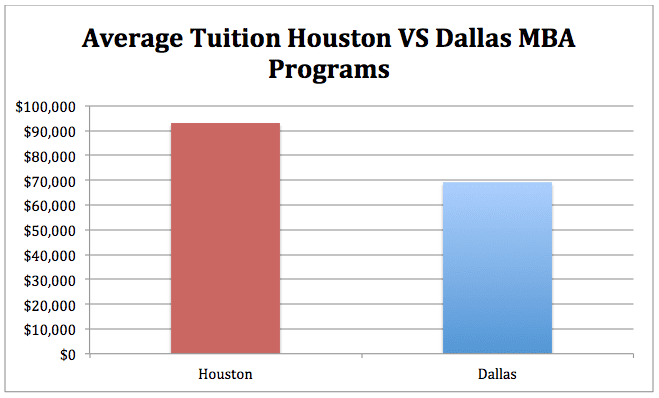
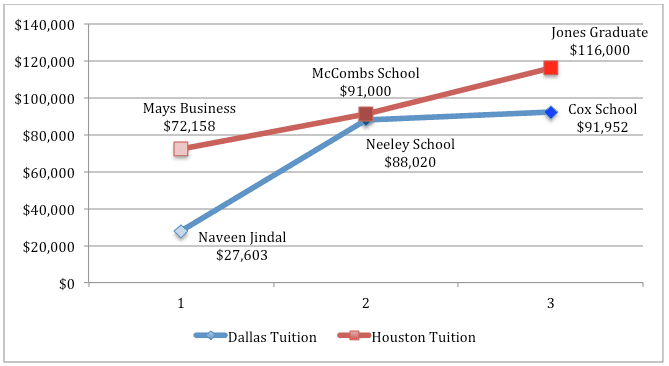
Texas MBA GMAT Averages
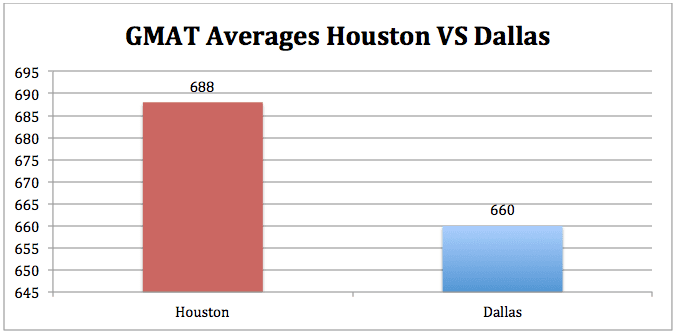
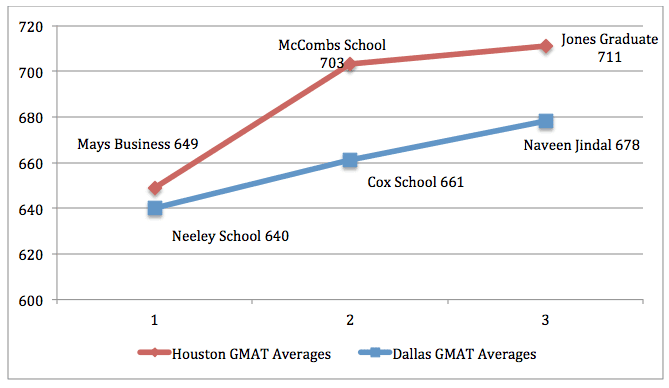
Texas MBA Post-Graduation Salaries
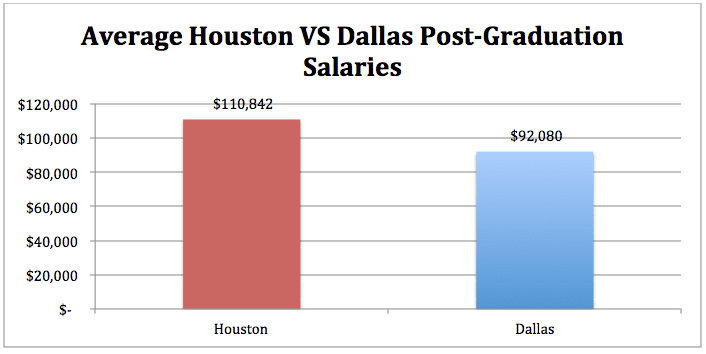
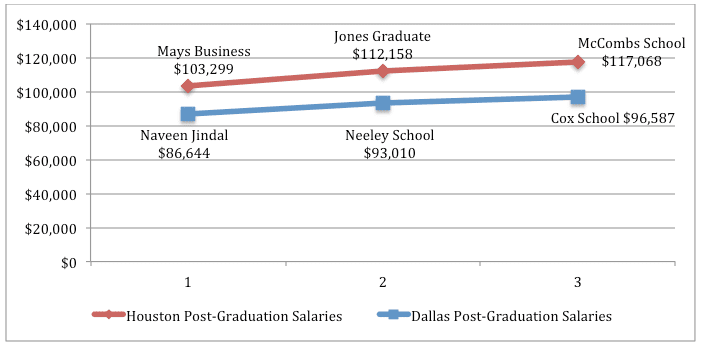
Lehigh MBA Success, and More – New York City News

Let’s explore some of the most interesting stories that have emerged from New York business schools this week.
Extraordinary Outcomes for Lehigh’s 1-MBA and M2 Programs – Lehigh College of Business and Economics
This past spring saw Lehigh graduates from the College of Business and Economics’ inaugural 1-MBA (1-year full-time MBA) cohort, as well as the third cohort of its M2 (MS in Management) complete the transition from the classroom to the boardroom.
Employers like Tesla, QVC, and Hubspot snatched up 1-MBA graduates while Amazon, Bloomberg, IBM, KPMG, and more extended offers to nearly 80 percent of M2 graduates. This statistic is very much in line with figures from the 2017 graduates of the M2 program—96 percent of which were employed within three months of graduation by the likes of Deloitte, Vanguard, IBM, and Amazon.
You can read more about the recently Lehigh MBA success here.
School of Management Students Provide Support to Businesses Looking to Export – Binghamton SOM Blog
This semester, Binghamton SOM students took part in the six-month ExportNY “Launch into the Global Marketplace” program, a unique offering that adjunct assistant professor founding director of the Center for International Business Advancement (CIBA) Elena Iankova developed to help give “regional businesses [the] knowledge and resources needed to export their products.”
The basic idea that underlies the “Launch into the Global Marketplace” program is that students research, consult, and support the export plans of participating businesses. Iankova explains: “It’s a two-way street. The students provide the companies research assistance and consultation, and the companies provide the students real-life experiential learning opportunities, helping them develop their management research and consulting skills.”
The program is a partnership between the CIBA and the Alliance for Manufacturing & Technology (AM&T), the Global New York Program of Empire State Development, and the U.S. Commercial Service and the Small Business Administration.
One of the participating companies, Awestruck Ciders, “produces hard ciders from NY state apples” and hopes to export its product to the South African market. Co-founder Patti Wilcox writes: “We think it’s important to the local economy to expand our view of the market on a global scale. We’re fascinated by this idea of an international cultural exchange, and we think doing so commercially is very valuable.”
You can read more about the program here.
The Endless Scroll: How to Tell if You’re a Tech Addict – PC Mag
Just recently, PC Mag dropped its lengthy article “The Endless Scroll: How to Tell if You’re a Tech Addict,” written by Rob Marvin.
In the piece, Marvin highlights Irresistible: The Rise of Addictive Technology and the Business of Keeping Us Hooked from NYU Stern School of Business professor Adam Alter, who doesn’t mince his words when it comes to tech addiction.
“There’s a myth that there’s something different about people with addictions from people without addictions,” Alter explained in his interview with Marvin. “Right now, if you are a person who doesn’t have an addiction, does that make you in some qualitative or categorical way different from people who do? The more I’ve studied this, the more I realized that just isn’t true.”

“Right now, if you are a person who doesn’t have an addiction, does that make you in some qualitative or categorical way different from people who do? The more I’ve studied this, the more I realized that just isn’t true.” – NYU Stern professor Adam Alter, interviewed by PC Mag / Photo via PC Mag
You can read more from Marvin’s excellent piece, out now, over at PC Mag.
What are the Best Healthcare MBA Degrees in Toronto?

The Toronto metro is not only home to a number of the finest business schools in Canada—it is is one of the top cities in North America for healthcare and human health sciences. According to the City of Toronto, the city’s life sciences sector employs nearly 30,000 professional and contributes more than $2 billion to the local economy. In a word, Toronto healthcare is huge.
The Best Toronto Business School Internship Opportunities

Toronto is known as one of the major financial centers in North America, and boasts a high concentration of banks and brokerage firms in its bustling Financial District. The city is also home to the Toronto Stock Exchange—the world’s seventh-largest stock exchange by market capitalization.
